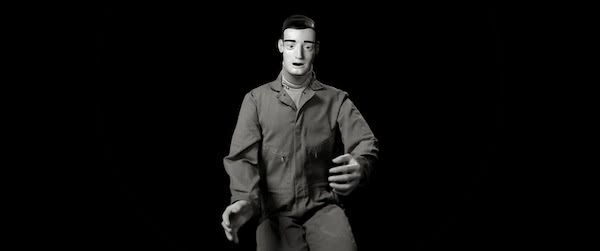Composer Philip Glass and filmmaker Godrey Reggio have a working relationship that is stronger than most. Glass has composed music for every one of Reggio’s films, including the legendary Qatsi trilogy, epic and beautiful meditations on a world in a state of flux.
Their latest collaboration is Visitors, which will screen as part of next year’s Sydney Festival. The black and white film has been called a ‘time capsule for the 21st century’, and features a haunting score composed by Glass. “I feel that in terms of his work, he never repeats himself,” Reggio explains about the pair’s long-standing collaboration. “The more we work together, the more I get to know his language, and the more he understands mine. It’s like a dance, and with each film, we become more in step with each other. His music is extraordinarily cinematic – there is so much going on. I feel that working with him, there are almost unlimited opportunities to explore.”
The pair’s working methods, Reggio tells me, are vastly different than those that might be typical of a film director and a composer. “I ask Philip not to write note one until he’s fully absorbed the composition of the film,” Reggio says. “He goes to the locations where we shoot, which is normally unheard of for a composer.” The two then get together and speak about the thematic content of the film, in both practical and poetic terms. “When he’s finished, I usually hear the music first on piano and give my comments, and it will start to develop,” Reggio continues. “We’ll go back and forth and keep doing the dance. It’s a reciprocal process. Most directors will give their soundtrack composers cues, anything from a few seconds to a minute or two. With my films, Philip is writing a full symphonic score, so it takes on a whole new dimension.”
Reggio himself has long been fascinated with the idea of technology. The notion of a ‘technological universe’ is a theme that suffuses all his films, and is played out in fascinating ways in Visitors. A recurring image in the film is that of faces staring at screens. Some of the people involved are watching television, others playing video games, but to watch them is strange and fascinating. “I think we’re creatures of habit, and the things we do every day inform the content of our minds,” Reggio says. “Here we are, transfixed and addicted to our screens – we use those, and they deliver knowledge to us, but in a very disembodied way. They’re changing the way we think. All over the planet, right now, billions of hands are touching gizmos at this moment, and billions of eyes are looking at screens. Children are born into a world of screens now, and I can only imagine how that will shape their minds.”
I put it to Reggio that his film has been called an ode to modern life. That being the case, I ask for his thoughts on the modern condition. Will future generations view our customs as odd, and indeed, will they see us as a selfish civilisation? In response, he paraphrases Matthew, Chapter 7, Verse 16. “You will know them by their fruits,” he says. “I think that’s the simplest way to put it. We are leaving a bad taste on the planet in our pursuit of happiness. Generations from now, people will look back and say that we weren’t thinking of them, they’ll say that we disregarded the fact that the planet’s resources are finite. We’re creating problems that future generations will have to deal with because of our rush to happiness.”
BY ALASDAIR DUNCAN
Visitors presents at the Sydney Opera House for Sydney Festival 2014 from January 23-24.

































